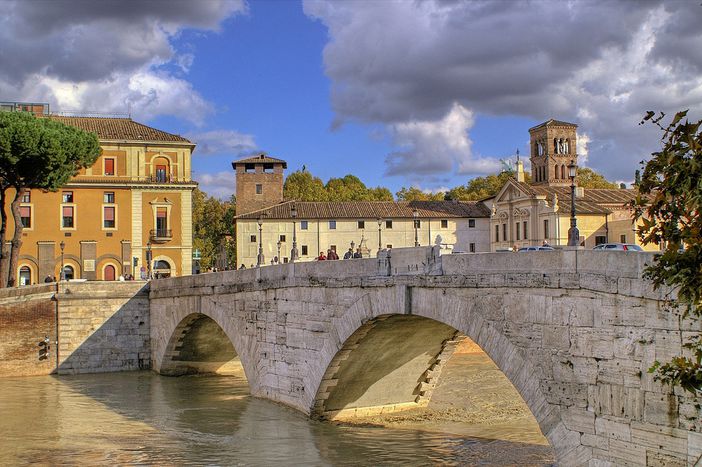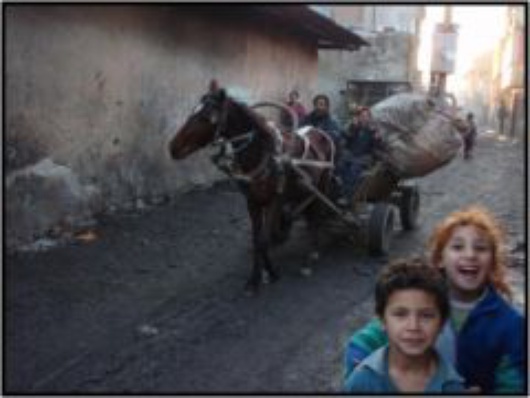
‘Roma’ Seminar in Sofia
Published on
The French and Italian Ambassadors- Mr. de Poncins and Mr.
Benazzo initiated a campaign about the ‘roma’ problems in Bulgaria, which ended with a final round-table in the French Institute: “Roma in Bulgaria: Integration and Migrations”
The round table took a closer look on Sliven and its large ‘roma’ suburb “Nadejda”, where in more than ten years time since the famous “Democracy” in 1989, nothing has changed. There are no houses, most of the buildings are under construction, but five families normally share this kind of accommodation. There are often cuts of electricity, enormous wholes on the streets that need a lot to resemble an image of a regular European road. In these miserable conditions it is difficult for the parents to think about the future of their children and their education, which is obligatory until 16 years of age.
A major problem to reach the established ending age of education are the marriages of young ‘roma’ girls /12-13 years of age/, who are forced to quit school in order to take care of their children. Ms Miranda Vuolasranta, from the Finnish Roma Forum, claims that these marriages are not a tradition in the ‘roma’ societies, but evidently for all the rest of the ‘roma’ at least in Bulgaria, this is not the truth. Another major problem is acceptance and integration in nowadays Bulgarian society, which simply does not care and is unaware of the ‘roma’ problems, because the governors stay quiet and when somebody is to blame normally they point at the ‘roma’, which encourages racism and marginalization of every ‘roma’ representative. Some ‘roma’ parents do not want their children to go to a Bulgarian school as they themselves are not integrated in the Bulgarian society and their children, in their opinion, will not be either. Their Bulgarian counterparts do the same, when they are aware of the presence of ‘roma’ children in the class, they prefer to change the school of their children.
Even though, a great number of ‘roma’, who speak Bulgarian, remember the age of the communist regime, when ‘Roma’, ‘Turkish’, ‘Jewish’ and ‘Bulgarian’ children were going together to the schools and there was not an ethnical differentiation. These parents are conscious that they must be proactive, that they should not wait for somebody to come and give them a hand, but find a way themselves, through NGOs and well structured projects to ask funds for, like the creation of a public library or nursery schools, which will make the life of the society better one. Nevertheless, a priority is that they need to learn Bulgarian in order to integrate better and help their children in their studies and qualification. Here is a paradox: Bulgarian citizens-‘roma’minority, which as such has to preserve its identity, but as citizens of the country it is more than a necessity for them to speak the language.
 Another topic is the education coming from the family and the examples these children have before stepping into the society, which often are not the best. An argument raised by Ms. Diana Kirilova, a PhD student in the Sorbonne University of ‘roma’ origin, was the teaching process in the Bulgarian schools and the ‘roma’ children marginalization inside the classes, as well as the inpreparation of the teachers in the Bulgarian schools. She talked about the number of students which in her opinion is elevated, she claimed 25 students per class, which is a normal number for every Bulgarian school and is not a reason for marginalization. The problem here is how to deal with ‘roma’ students, who are unable to speak Bulgarian and integrate them at the same level corresponding to their age with the other students. The obstacle is not the number of children, but the school organization for extra curricular classes and additional help. The preparation of the teachers is arguable as most of them have to pass a special training and studies before being hired. There was an interview with a ‘roma’ future teacher of children who claimed himself that he makes some grammatical and orthographical errors, but as he is ‘roma’ he did not count in the survey of Ms Kirilova. Another socially integrated ‘roma’ is Mr. Milen Milanov from the Ministry of Labour, who did not differ much from the average Bulgarian business and political elite in terms of conduct and diplomatical argumentation, which hides more than reveals. The representative of the Ministry of Education in this meeting was just a defenseless figure, who wasn’t able to answer any of these important quests as it was not in her power. The question is why the Ministry did not try to send somebody in power to put on the table valuable and needed solutions. Once again the Ministry ignores serious problems that is shameful not to take into account as European country. The only valuable contributions in this meeting were the presentations of Mr. Michel Guet, Council of Europe, with solutions and practical changes for the minority classes; Ms Vicari, Vice-prefect in Milan, with developed and used suggestions and examples, of how the Italian authorities deal with similar problems; and Dr. Olivier Adam, Doctors of the World, with a very sober point of view and concrete requests for the Bulgarian authorities of the unhealthy conditions the ‘roma’ have to live.
Another topic is the education coming from the family and the examples these children have before stepping into the society, which often are not the best. An argument raised by Ms. Diana Kirilova, a PhD student in the Sorbonne University of ‘roma’ origin, was the teaching process in the Bulgarian schools and the ‘roma’ children marginalization inside the classes, as well as the inpreparation of the teachers in the Bulgarian schools. She talked about the number of students which in her opinion is elevated, she claimed 25 students per class, which is a normal number for every Bulgarian school and is not a reason for marginalization. The problem here is how to deal with ‘roma’ students, who are unable to speak Bulgarian and integrate them at the same level corresponding to their age with the other students. The obstacle is not the number of children, but the school organization for extra curricular classes and additional help. The preparation of the teachers is arguable as most of them have to pass a special training and studies before being hired. There was an interview with a ‘roma’ future teacher of children who claimed himself that he makes some grammatical and orthographical errors, but as he is ‘roma’ he did not count in the survey of Ms Kirilova. Another socially integrated ‘roma’ is Mr. Milen Milanov from the Ministry of Labour, who did not differ much from the average Bulgarian business and political elite in terms of conduct and diplomatical argumentation, which hides more than reveals. The representative of the Ministry of Education in this meeting was just a defenseless figure, who wasn’t able to answer any of these important quests as it was not in her power. The question is why the Ministry did not try to send somebody in power to put on the table valuable and needed solutions. Once again the Ministry ignores serious problems that is shameful not to take into account as European country. The only valuable contributions in this meeting were the presentations of Mr. Michel Guet, Council of Europe, with solutions and practical changes for the minority classes; Ms Vicari, Vice-prefect in Milan, with developed and used suggestions and examples, of how the Italian authorities deal with similar problems; and Dr. Olivier Adam, Doctors of the World, with a very sober point of view and concrete requests for the Bulgarian authorities of the unhealthy conditions the ‘roma’ have to live.
Check out the website of the documentary movie "La cité des Roms"



